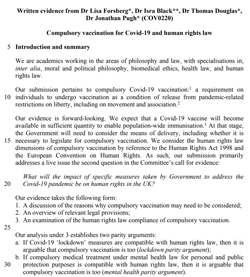 |
|
|
|
The all party select committee looking into Covid-19 (Parliamentary committee on COVID-19) and the government response has received evidence in the form of a document from several experts in the areas of philosophy and law, with specialisations in, inter alia, moral and political philosophy, biomedical ethics, health law, and human rights law, stating that Covid-19 vaccinations of the whole of the UK's population should be made mandatory! The authors of the document entitled 'Compulsory vaccination for Covid-19 and human rights law' are from University of Oxford, Dr Lisa Forsberg, Dr Thomas Douglas, and Dr Jonathan Pugh. From University of York, Dr Isra Black. They have also written a Blog for the Journal of Medical Ethics with regard to the issue of mandatory vaccination here
Our submission pertains to compulsory Covid-19 vaccination: a requirement on individuals to undergo vaccination as a condition of release from pandemic-related restrictions on liberty, including on movement and association. Our evidence is forward-looking. We expect that a Covid-19 vaccine will become available in sufficient quantity to enable population-wide immunisation. That second question in the call for evidence, is this: 'What will the impact of specific measures taken by Government to address the 20 Covid-19 pandemic be on human rights in the UK?' The document answers this in a number of ways: 1. A discussion of the reasons why compulsory vaccination may need to be considered; 2. An overview of relevant legal provisions; 3. An examination of the human rights law compliance of compulsory vaccination. They say that, their analysis under item 3 establishes two parity arguments: a. If Covid-19 ‘lockdown’ measures are compatible with human rights law, then it is arguable that compulsory vaccination is too (lockdown parity argument); b. If compulsory medical treatment under mental health law for personal and public 30 protection purposes is compatible with human rights law, then it is arguable that compulsory vaccination is too (mental health parity argument).
'Our chief conclusion is that, as and when a vaccine becomes available at scale, the Government should give serious consideration to compulsory immunisation as a 35 means of reducing the impacts of Covid-19. There is an arguable case for the compatibility of compulsory vaccination with human rights law.' However, they do point out in the notes to their submission: '...that there is disagreement about what compulsion means and as to whether different kinds of non-voluntary vaccination schemes are in fact compulsory schemes. This is in part a theoretical disagreement, and in part a practical one to do with the nature of state sanctions that back any scheme. See Emma Cave, ‘Voluntary vaccination: the pandemic effect’ (2017) 37(2) LS 279-304....' There is also a chapter on Mental Health Law which points out the circumstances under which patients can be 'sectioned' and makes the argument for changes to the law to allow for compulsory vaccination in those suffering from mental health illness. Page 3, para 70 states: 'In addition, Schedule 21 of the Coronavirus Act 2020, grants extensive powers across the four UK jurisdictions to screen and assess individuals who have potentially been infected with coronavirus outside the UK.' In pointing out the changes to the law will be required with regard to those suffering mental health illnesses, para 95 states: 'Part IV of the Mental Health Act 1983 governs consent to treatment for patients detained under section 3 of the Act. Section 63 of the Mental Health Act 1983 provides that the consent of any patient, including those who possess decision-making capacity 95 under the Mental Capacity Act 2005, ‘shall not be required for any medical treatment given to him for the mental disorder from which he is suffering…’. Section 63 of the Act is subject to specific and limited exceptions in respect of certain kinds of treatment.' The evidentiary document to the House of Commons Select Committee looking into Covid-19, was leaked to ex-BBC journalist Anna Brees. Following her placing it on her Twitter account for circulation via social media; it can be downloaded here It must be noted that her Facebook account was closed down by them, and it may well be that her Twitter account also suffers the same fate. As an independent journalist with years of experience, she often interviews those ignored by mainstream media outlets, and produces evidence in all of her news items. Source: Anna Brees Media / Twitter / University of Oxford |

 The authors of the document point out in their introduction to their evidence:
The authors of the document point out in their introduction to their evidence: The evidentiary document concludes:
The evidentiary document concludes: